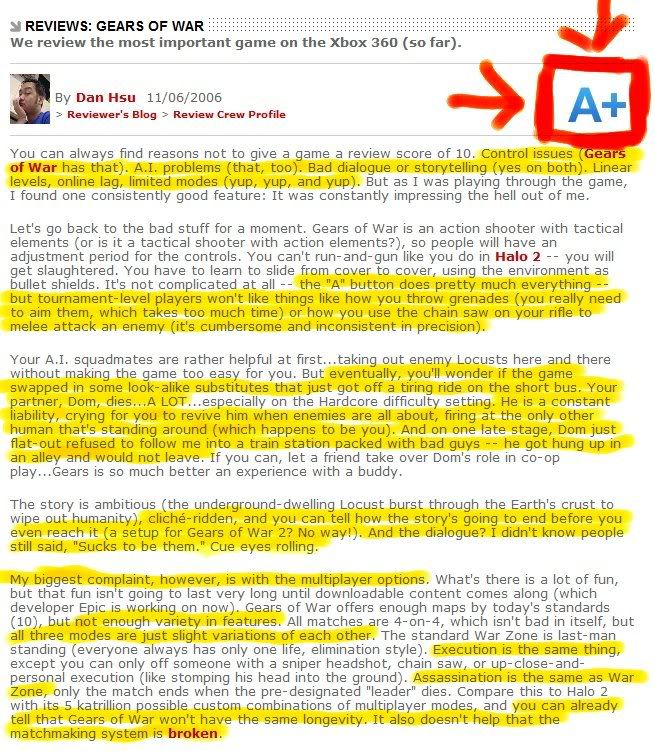 Above is an image of Dan Hsu/1UP's review of Gears of War way back from 2006. Reading it now, in retrospect, you get to realize how unreliable video game reviews are these days.
Above is an image of Dan Hsu/1UP's review of Gears of War way back from 2006. Reading it now, in retrospect, you get to realize how unreliable video game reviews are these days.Despite all the negative comments in that review (even going so far as to calling Gears' multiplayer as 'broken') the game is still one of the most popular games on the Xbox 360. It's still hanging on in Major Nelson's Top 10 games on Xbox Live:
http://majornelson.com/archive/2008/07/02/live-activity-for-week-of-june-23rd.aspx
"Xbox 360 Top Live Titles (based on UU’s)
1 Call of Duty 4
2 Halo 3
3 GTA IV
4 Battlefield: Bad Company Demo
5 Guitar Hero III
6 Gears of War
7 Rock Band
8 Battlefield: Bad Company
9 Tom Clancy's Rainbow Six® Vegas 2
10 FIFA 08 "
Not bad for a game with "broken multiplayer" and supposedly imprecise gameplay mechanics with the melee combat....And later on it turns out that the 'imprecise, hard to control' chainsaw is everyone's favorite aspect of the game, becoming the most memorable aspect of Gears' gameplay.
This is one of those reviews that, when you look back years after it was written, clearly damages the credibility of the one that wrote it. Does this writer really know games, and what games appeal to the gamers of today? Does he know what differentiates a good game from a terrible one? It's also one of those examples where newer game franchises never seem to get a fair shake from the gaming press, who seem to hand out 10's freely to established names and look over their flaws, while calling out other, newer game brands for one or two moments of framerate stutter; usually deducting a whole point (or more) for a small infraction.
Anyway, right now Dan Hsu no longer writes for 1UP and works now for Microsoft Game Studios(Ironically, he's on the same team working on Gears of War 2), but this clever piece of writing serves as a reminder for gamers that game reviews are just another opinion from just another gamer---they aren't the end-all-be-all-ultimate-final-judgment on the quality of a particular game title. In fact it's entirely possible that a great game can get a horrible rating and be missed out on by so many gamers--that's a sad reality in today's gaming industry, that the hard work of some developers can be disregarded by many gamers with just a paragraph or two of ill-informed diatribe. The Gears of War series, in a way, got lucky that reviews like that one weren't enough to stop it from being a multi-million dollar hit. I can't imagine what kind of effect reviews like that could have to other similar, smaller budgeted (and less marketed) games. I'm not saying that most games that get low ratings are probably good---I'm sure there are lots of bad titles out there that get the score that they deserve. It's just that I totally loathe the practice of having higher standards for newer game franchises and handing out free passes for much older, established game franchises (i.e. game sequels) with huge fanbases. I'm guessing that most sites are afraid of getting hate mail or losing site visitors if they tell it like it is for a game that has a well established legacy, or for a series that adheres to a time-honored tradition (even if said tradition is already showing its age in the face of newer gameplay mechanics).
I think it's best for gamers to set aside reviews as just another opinion in the sea of opinions that are available right now. With the Internet you can find even more feedback on the games that get released, and surely it's possible to find feedbacks which coincide with one's own taste in games. Furthermore, it's becoming easier to simply try a game before deciding whether or not to buy it. Game demos are readily available, and in some cases you can simply just rent a game and decide for yourself if its worth it. Overall, the value of 'game reviews' as a measure of game quality has clearly diminished. Often when a new game gets released I don't even go straight to the review; I prefer visiting an online forum and reading everyone's opinion on a game and making up my mind about it by then, then I just compliment that by actually trying the game if a demo is available. I've also noticed that when I recommend a game, I only rate it three ways, and I don't really like to give it a numerical score: A game can be worth buying, worth borrowing/renting, or it's totally not worth buying at all. Then I usually just say what I like about it, in general/as a whole. I don't really nitpick little details like the occasional framerate problem unless it makes a game completely unplayable. That's my current standard when it comes to talking about what I think about a particular game.
In today's connected world, it's far easier to make up your own mind about something because all the means to do so are available to you (thanks to technology). I'm just surprised that despite this, people still cling to having some authority tell them what's good and what's terrible. Maybe it's just human nature to have someone else approve or disapprove of your own tastes.
Don't let other people stop you from having fun on your own terms.